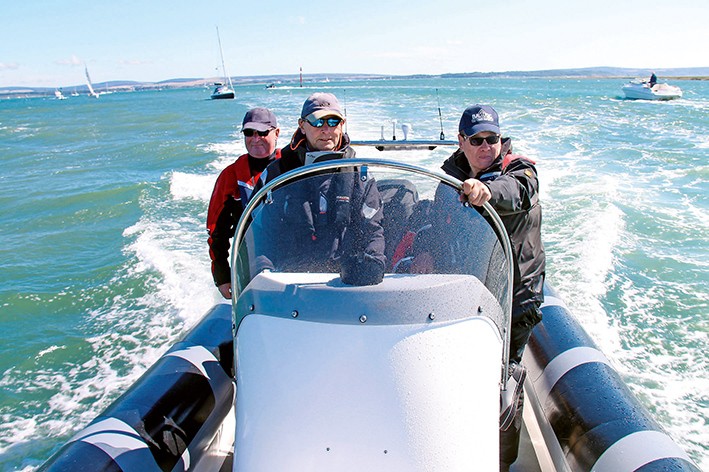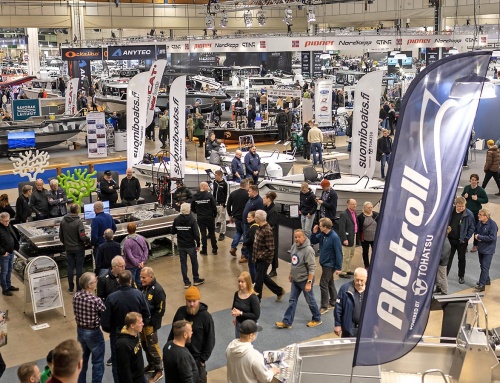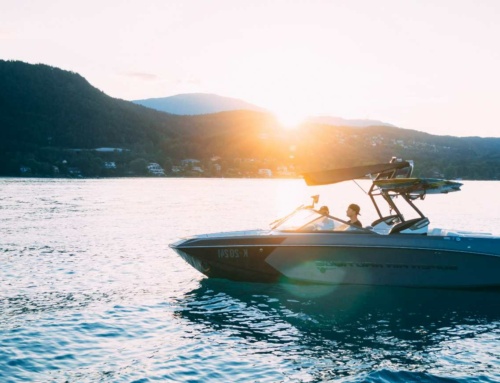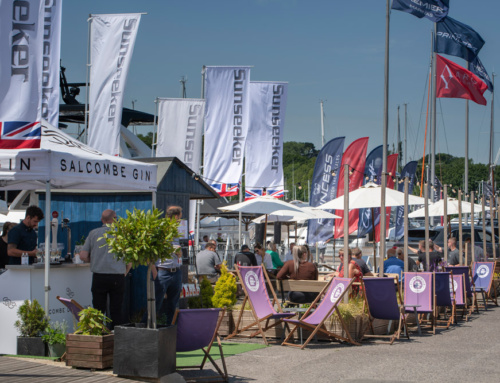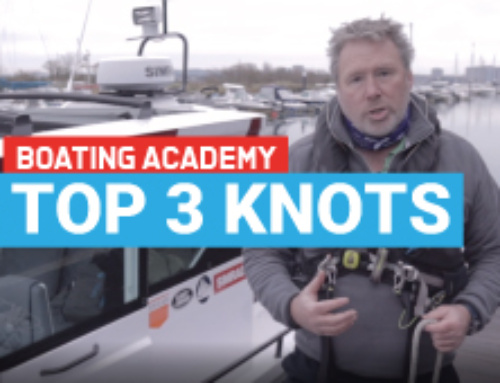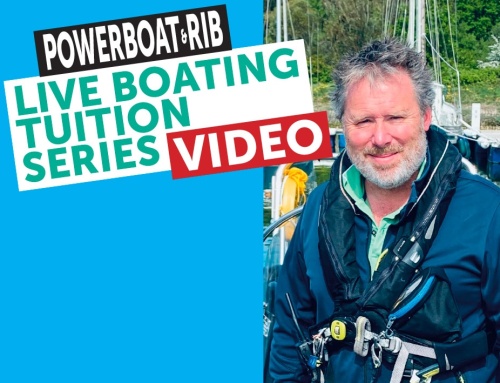Peter Talbot discusses the pros and cons of the world of bareboat chartering …
While you may mostly associate yachts with bareboat chartering, bareboat RIB charters are also now available in the UK. So with the necessary qualifications you can charter a RIB and, within certain limits, use it in a coastal environment at various locations in the UK. Bareboat chartering will appeal to a variety of groups, ranging from potential RIB owners of the future, who either don’t own a boat at present or own a different type of boat, through to current RIB owners who want to try a different make or model (of boat or engine) or want to visit a new area of the UK without the need to trail their boat. With advantages including no large initial outlay or annual depreciation, and no storage/maintenance costs or annual insurance, some may even find the benefits of chartering make it a realistic long-term alternative to ownership. Disadvantages include perhaps narrowing your options in terms of locations and maybe losing some flexibility/spontaneity (RIBs may need to be reserved in advance in busy periods, i.e. before detailed forecasts are available). Boaters who like the idea of owning a boat may also find chartering on a permanent basis isn’t quite the same.
Solent RIB Charter
Holding the necessary RYA certification (typically a Level 2 powerboat certificate, ICC or higher), and with previous RIB experience (helming safety boats for the local sailing club and sea scouts), I was interested in chartering a RIB with a group of similarly experienced friends to explore a new area of coastline. As most of my boating is done in my Zodiac SIB (from the smaller end of Zodiac’s range), I was also interested in chartering a larger and different style of boat to mine. After researching companies and locations online, I settled on Solent RIB Charter (SRC), who own Europe’s largest fleet of RIBs and are based on the Solent. This location had the attraction of being new to me (one of our group had previous experience), and was an area that would give us a range of day trip options. The RIBs are moored in Lymington Yacht Haven (LYH), but SRC can arrange charter or skippered boats from other sites around the UK (delivery charges apply). LYH have been awarded ‘5 Gold Anchor’ status by Which Marina? and have excellent facilities including free parking, toilets, showers, restaurant and bar, which you’re welcome to use. SRC have their own area on the pontoons and each RIB has its own separate ‘docking bay’, and their boats carry no SRC branding.
Our choice of RIB
The two main types of bareboat RIBs available are 7.8m (up to eight people) and 8.8m (up to 10) Ribcrafts, powered by Suzuki 250hps. We opted for the 7.8m as we’d only have a maximum of four people on board. Seating comprises four single fixed jockey seats and two double. The front two jockeys (helm and navigator) have side supports on the seat backs for enhanced comfort and safety when standing. There’s plenty of storage under the seats, and in front of the console in two compartments.
With a full fuel tank (270 litres), we were told the range was in excess of 200nm. The RIB was comprehensively kitted out, boasting a range of equipment including a GPS plotter, VHF, compass, life raft, flares, anchor, warp, first-aid kit, fire extinguisher and roll-up bathing ladder.
Our time afloat
The boat handover on day one was both thorough and efficient, including a tour of the boat and an inspection for damage (like when you pick up a hire car). Safety equipment was pointed out in the various lockers, and engine starting procedures and use of the kill cord explained. A safe stance to protect your back while underway was also demonstrated. On our first day we headed out from Lymington into the Solent and west to the Needles. With a good forecast, light winds and a sunny day ahead, we circled the Isle of Wight in an anticlockwise direction. The westerly wind freshened a little in the afternoon, so by the time we were back in the Solent and heading past the Napoleonic forts, the surface was a little choppy. Predictably, there was a lot of traffic to watch out for, ranging from commercial traffic such as ferries to yachts, private fishing boats and a number of RIBs like us. We ended the day back in Lymington, having travelled around 65nm. Having booked the RIB for two days we’d had the option of mooring in a different marina overnight (the insurance provided covers the boat in another marina overnight, but doesn’t cover use after sunset). However, we’d opted to return the RIB to its Lymington base for the night (to its own berth, at no cost), as that allowed us to drop off one of our group who was just down for the first day, meant SRC could refuel the boat for us (they also get a slight discount on the fuel at LYH) and also made pre-booking our accommodation easier (as there was no need to book different locations).
Day two was fortunately another fine day, and we went west along the ‘Jurassic Coast’ (a World Heritage site) to Lulworth Cove and back, a total distance of around 70nm. The interaction of tide and wind can cause confused water around St Albans and Durlston Heads, so plan carefully for your journey. Lulworth Cove is an interesting geological feature and popular with boaters, jet-skiers and kayakers.
The costs
Hiring a 7.8m RIB with SRC costs £360 per day (the daily rate drops if you buy a three-, seven- or ten-day card). This significant sum of money can of course be shared across those on board (i.e. up to eight people), which helps lower the cost per person. We knew early on that our group size would be four on day one and three on the second day. We’d previously discussed whether to go for the second day (given the higher cost per person) but decided to go ahead, given that we would all have travelled some distance to get there. Fuel is not included in the hire cost, but the SRC website gives you an indication of typical costs. Our 65nm trip around the Isle of Wight used 118 litres of fuel, which cost £150. Our slightly longer trip on day two (70nm) used 138 litres costing £175. While underway, we generally kept the engine at around 3000rpm, which gave us about 18 knots in all but the choppiest water we encountered. If we’d had eight people on board for both days, the boat and fuel costs combined would have worked out at a total cost of £65 per person per day (though we’d likely have used more fuel with more people on board). From the range of typical fuel costs quoted on the SRC website, I think our two trips were longer than the average journeys taken by those chartering SRC RIBs, but the figures on the website were useful for planning purposes.
Insurance for the RIB is included in the daily charter rate, but the excess is £3,000 (i.e. the charterer is liable for the first £3,000 of any loss or damage). SRC say this is to encourage careful handling of the RIB (which is valued at around £60,000). Because of the amounts involved, it’s best to discuss all the likely costs (and the size of the excess) with everyone beforehand, to avoid the chance of any misunderstandings. It’s also worth discussing what would happen in the unlikely event that anyone had to withdraw from the trip at the very last minute (e.g. due to illness).
The other costs were our travel to Lymington (we car-shared), accommodation and food. After searching around, I booked a couple of rooms at Lymington’s Premier Inn (5 miles west of Lymington at Hordle) on a room-only basis. There are plenty of bars and restaurants in central Lymington (including a Wetherspoons), and also a range of shops including chandleries and a Tesco.
Other considerations
While it’s good to have some flexibility built into your plans (e.g. for weather changes), it’s worth having a discussion in advance about people’s expectations of the trip, to agree some likely destinations and ensure everyone’s going to enjoy the time afloat. As with any trip, planning ahead is important (e.g. looking at the weather, tides, charts etc.) for safety and also to help you get the most out of the trip. SRC RIBs need to be kept within 20 miles of a safe haven at all times. They also don’t allow RIBs to be taken out in wind strengths of force 6 or more, so it’s possible to postpone your trip in the event of bad weather (e.g. strong winds or a full day of rain). If you’re planning an overnight stay in another marina, you may need to pre-book your berth and accommodation, and also check you can get any fuel you’ll need. If we’d experienced any issues with the RIB during the hire (e.g. with the engine), SRC said they’d have come out with two boats, one to recover the original RIB and one to leave with you, so we could continue. We left a passage plan with Solent Coastguard on both days (over the telephone, before leaving LYH) and rang back on our return.
Conclusion
Our group enjoyed the experience of hiring a large RIB for the first time, and exploring one of the most popular boating areas in the UK. We found SRC to be professional and very well organised. They were quick to answer questions ahead of our booking and keen for us to enjoy our time on the water. The RIB was well equipped (for safety and comfort), in excellent condition and proved an ideal boat for us. Chartering is not a cheap activity, but costs can be reduced by hiring in a group (e.g. friends or family). Taking out a multi-day card would also reduce the cost per day, and be especially attractive if you live within a short distance of the Solent. Hiring for consecutive days would allow you to berth in a different marina overnight if you wished. The decisions of the group influence the fuel bill, as this depends on the distance travelled and the boat’s speed.
Our group agreed we’d definitely like to hire another RIB in the future, either with SRC or another company, and would be interested in seeing another part of the UK this way.
Ideas for things to take on the boat
- RYA qualifications to show during handover (photocopies may suffice)
- Mobile phone(s) in waterproof case
- Refreshments (food/drink incl. snacks, plus hot flask)
- Handheld VHF (as spare)
- Seasickness pills
- Binoculars
- Chart(s)
- Life jackets – check what the company provides
- Handheld compass
- Drybags (as lockers may not be watertight)
- Camera(s)
- Sailing knife, multitool
- Suitable clothing for varying weather (e.g. waterproofs or drysuits, gloves, hats – check what can be provided)
- Sun protection – hats, sunglasses, suncream
- Basic first-aid kit
- Head torch (just in case)
- Basic repair kit – e.g. gaffer tape, cable ties, cord (for tying on sun hats)
- Pen/paper (for notes/listing any last-minute questions you want to ask)
- Useful telephone numbers stored in mobile phone (incl. Solent Coastguard, SRC contacts etc.)
- Weather forecasts and tidal information
- Good weather/bad weather options
- Glasses straps
Questions to ask before hiring
- What qualifications are needed to hire? (Do you need to see original certificates?)
- What are the insurance arrangements? (+ What is the excess?)
- What happens with bad weather? (Can we postpone the trip?)
- What time can we pick the boat up?
- What time is the boat due back?
- Is there car parking available?
- (And if hiring for more than one day: Where can we leave the boat overnight?)
Last-minute questions for day one
- What is the range of the boat (at what speed)?
- What is the boat’s name? (important when you’re logging a passage plan with the coastguard)
- Is the boat fully fuelled, and where do you recommend we refuel?
- Where is the safety equipment kept (i.e. spare kill cord etc.)?
- How do we notify the hire company of any problems?
- (Also make sure you’re happy operating the plotter/VHF before moving off)
Useful links
www.ukho.gov.uk/easytide/EasyTide/
https://www.yachthavens.com/lymington/
https://www.gov.uk/government/organisations/maritime-and-coastguard-agency/about/access-and-opening
Peter Talbot has owned Zodiac inflatable boats for the last 10 years, travelling over 1,200 miles in them (including multi-day journeys in the UK, Norway and Sweden), and writing about his adventures. Peter holds both RYA Advanced Powerboat and Safety Boat certificates and also a short-range VHF certificate. His enjoyment of being on water extends to its frozen form, and away from boats he’s been on ski touring expeditions to Greenland and Svalbard, undertaken research in Antarctica and helped survey a glacier in Norway.

